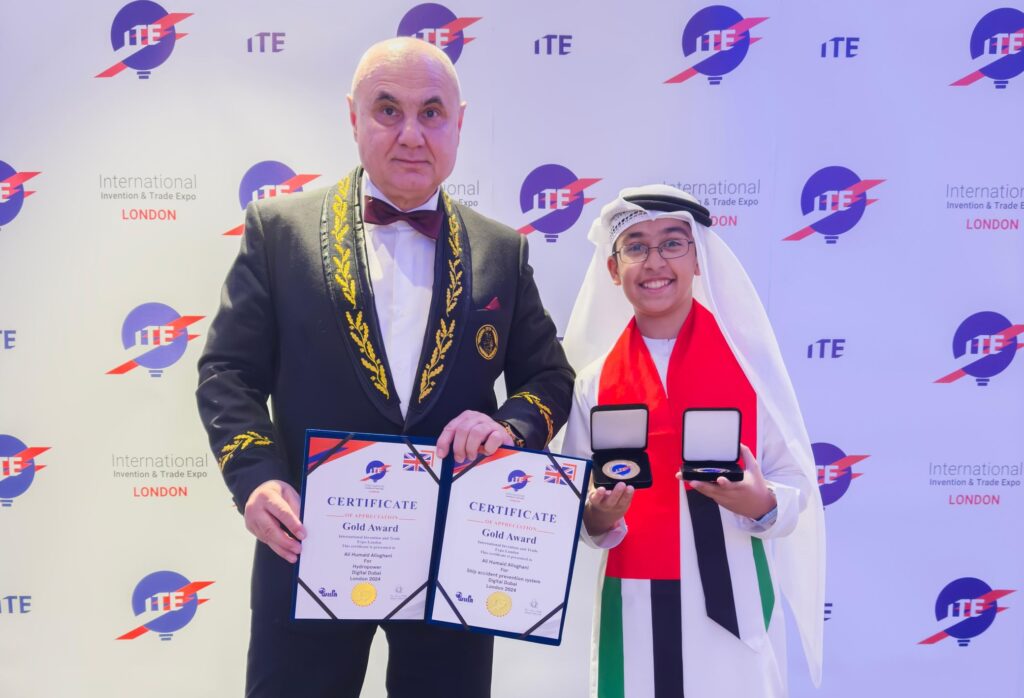Emirati student Ali Humaid Al Loughani received the Leadership Sash and Medal at the 6th International Exhibition of Inventions and Trade held in the British capital, London, in which he participated under the patronage and support of the Dubai Digital Authority, outperforming 285 inventors from different countries of the world, despite being the youngest participant in the international event.
Emirati inventor Ali Al Loughani presented two of his inventions: the “Ship Accident Prevention Project,” which relies on artificial intelligence technologies and aims to protect ships and enhance safety in the maritime navigation sector to high levels, in addition to the “Hydropower” project for generating hybrid energy, which combines solar energy and hydrogen fuel cells, and employs Internet of Things technologies.
for the two projects he participated in, and was honored by the Inventors Association of Romania, Norton University of Cambodia, and the National University of Science and Technology in Bucharest.
Al Loughani’s project, a ship accident system based on artificial intelligence technologies, is an advanced innovation that aims to enhance safety levels in the maritime sector through advanced technologies that monitor and analyze potential risks during navigation.
The technology of this project relies on collecting detailed data on sea conditions, ship speed, and weather conditions in real time, and analyzing them using artificial intelligence techniques.
Based on these analyses, the system can make proactive decisions to avoid collisions and marine accidents that could threaten the safety of passengers and cause significant damage to ships and marine infrastructure.
This innovative project can be part of global efforts to enhance sustainability in maritime transport, as it contributes to reducing the environmental impacts of marine accidents, such as oil spills and the resulting pollution. In addition, the system contributes to protecting marine life and ensuring the smooth and safe continuation of global trade.
combining solar energy and hydrogen fuel cells to provide a sustainable and efficient energy source.
The project depends on converting solar energy into electrical energy using solar panels, and then using this energy to produce hydrogen through the electrolysis process.
The hydrogen is stored and later used to generate electricity through hydrogen fuel cells, which contributes to reducing dependence on fossil fuels and reducing carbon emissions.
The project consists of solar panels that convert sunlight into electrical energy, hydrogen fuel cells that generate electricity by reacting hydrogen with oxygen, a charge controller to regulate the electrical voltage, batteries to store electrical energy, and an electrolysis generator to produce hydrogen from water.
The project aims to reduce dependence on fossil fuels, enhance energy sustainability, improve energy storage efficiency, and contribute to achieving sustainable development goals, especially in the field of clean energy and climate action. It is considered a model for renewable energy that can be widely applied in the future.
Student Ali Al-Loughani has a long record of creativity and invention, as he has previously won a number of awards and honors for his efforts and achievements.
Last year, 2023, he won the 34th edition of the Technology, Innovation and Invention Exhibition in Malaysia for his invention of a robot that helps senior citizens in their daily lives using Internet of Things technologies.
He won second place in the Young Inventors category out of 700 competing inventors from 19 countries around the world.
source/content: wam.ae (headline edited)
_______________

___________________________________
UNITED ARAB EMIRATES (U.A.E)